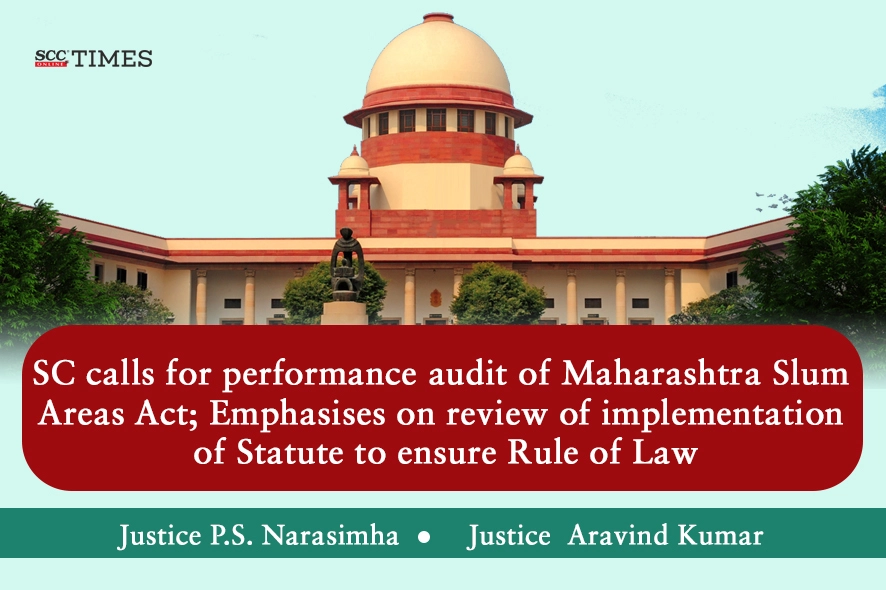Supreme Court: In an appeal against a decision of the Apex Grievance Redressal Committee and the Bombay High Court, upholding the terminating the development agreement was made in exercise of power under Section 13 of the Maharashtra Slum Areas (Improvement, Clearance and Redevelopment) Act, 1971, the Division Bench of PS Narasimha and Aravind Kumar, JJ. dismissed the appeal for being devoid of merits and upheld the impugned decisions. The Court requested the Chief Justice of the High Court to constitute a Bench to undertake the comprehensive statutory audit of the Act.
Factual Matrix
In 2003, the appellant was appointed as a developer by Harihar Krupa Co-Operative Housing Society Limited (‘respondent 1’), a co-operative Housing Society of slum dwellers. As the development of the slum areas under the Maharashtra Slum Areas (Improvement, Clearance and Redevelopment) Act, 1971 (‘the Act’) was unduly prolonged for over two decades, the development agreement in favour of the appellant was terminated by the Apex Grievance Redressal Committee (‘AGRC’) The order of termination was challenged by the appellant before the Bombay High Court, which came to be dismissed vide Yash Developers v. Harihar Krupa Coop. Housing Society Ltd., 2022 SCC OnLine Bom 3712.
Scope of Judicial Review against an order under Section 13 of the Act
The Court noted that the impugned order of the AGRC terminating the development agreement was made in exercise of power under Section 13 of the Act, which provides for the power of the competent authority to redevelop clearance area. The Court on perusal of the Section 13(2) of the Act, said that it specifically empowers the competent authority to re-determine the agreement if it is satisfied that the re-development has not been done within the time specified. Hence, it is a statutory duty of the competent authority to ensure that the project is completed within the prescribed time. The Court held that a writ of mandamus would lie against the authorities concerned if they do not perform the statutory duty of ensuring that the project is completed within the time prescribed. The Court referred Tulsiwadi Navnirman Co-op. Housing Society Ltd. v. State of Maharashtra, 2007 SCC OnLine Bom 1000 wherein it was held that the Slum Rehabilitation Authority (‘SRA’) has been conferred with certain powers and each one of them is coupled with a duty. If the slum dwellers are eligible to be rehabilitated at the site and within a reasonable period, they cannot be left at the mercy of developers and builders. The slum dwellers cannot be expected to occupy a transit accommodation endlessly, without proper maintenance, and hygiene. An independent and impartial implementation, supervision and monitoring of the projects is the purpose for which the authority has been set up under the Act.
Decision
The Court, regarding the findings of the AGRC and the High Court on the question of delay by the appellant at various points of time, held that they were correct on law and fact. The Court noted and said that it is admitted that the delay in executing the project, by the time of the termination order was more than 16 years, which was sought to be explained by fragmenting it into bits and pieces falling between 2003 to 2011, 2011 to 2014 and 2014 to 2019.
The Court opined that the delay of eight years in resolving disputes with a competing builder cannot be a justification under any circumstance. The appellant is a developer and fully understands the process of obtaining environmental clearances while other sanctions and permissions are pending, and it is for him to make all the necessary arrangements. To say the least, the non-cooperation of some of the members cannot be a ground for delaying the project from 2014 to 2019. The Court upheld the AGRC’s and High Court’s findings saying that they correctly held that the delay caused due to the sanction of the draft DP for the construction of the road cannot be a justification for delaying the project from 2015 to 2019. The Court stated that the execution of the project under the Slum Rehabilitation Scheme cannot be viewed as a real estate development project. There is a public purpose involved, and that is inextricably connected to the right to life of some of our brother and sister citizens who are living in pathetic conditions.
Regarding the question of maintainability of the appeal before the AGRC and the question that the collaborator of the appellant must face the same consequence as that of the appellant, the Court said that irrespective of whether anybody applied or not, the authority is bound to ensure that the project is completed within the time stipulated.
Hence, the Court dismissed the appeal for being devoid of merits with costs of Rs. 1,00,000/- payable to Supreme Court Mediation and Conciliation Project Committee.
Performance audit of Act
The Court noted that since the Act came into being in 1971, for over five decades, the High Court has been exercising judicial review jurisdiction, disposing of Writ Petitions raising claims or challenges to the exercise of powers or dereliction of duties by Authorities under the Act. Data fetched from National Judicial Data Grid (NJDG) reveals that a total of 1612 cases involving disputes arising under the Act are pending before the High Court. Of these, 135 cases are more than 10 years old. In the last 20 years, 4488 cases have been filed and disposed of under the said Act.
“The Act is a beneficial legislation, intended to materialize the Constitutional assurance of dignity of the individual by providing basic housing, so integral to human life. However, the propensity and the proclivity of the statute to generate litigation are worrisome. There seems to be a problem with the statutory framework for realizing the purpose and object of the statute.”
The Court noted that in Galaxy Enterprises v. State of Maharashtra, 2019 SCC OnLine Bom 897, the High Court raised a concern that, considering the volumes of disputes still reaching the Courts, it can certainly be said that time is ripe, if not too late, to ponder, whether things are realistically working in the right direction, to eradicate slums and rehabilitate the slum dwellers, with the desired efficacy and expedition. It can be seen that scores of slum schemes have remained incomplete for years together and are languishing on such issues, either in litigation before Courts and/or before the authorities.
The Court pointed out the following issues with the Act:
-
Identification and declaration of land as a slum. This involves an examination of the role of authorities in giving such recognition, insidious intervention of builders in the said process cast doubts on the independence and integrity in the decision-making process.
-
Identification of slum dwellers involves a complicated process of proof of such a status, the attendant problem of groupism, giving rise to competing claims inevitably leading to litigation.
-
Selection of a developer is left to the cooperative society of slum dwellers by the Act, and the majority decision is manipulated by competing and rival developers.
-
Apportionment of the slum land between redevelopment area and sale area.
-
Obligation to provide transit accommodation for the slum dwellers pending redevelopment. The developer does not provide transit accommodation within time or provides an inadequate alternative in the form of a quantified amount towards rent, On the other hand, there are instances where some slum dwellers refuse to vacate the premises on the ground that the transit accommodation is either inconvenient or the amount offered is insufficient.
-
Lack of independence and objectivity in the functioning of statutory authorities. Courts have witnesses that the authorities have no independence and, their tenure is also short.
-
Effectiveness of statutory remedies is lacking along with accountability.
-
Judicial review proceedings under Article 226 cannot be a long-term solution.
The Court added that assessment of the working of the statute to realise if its purpose and objective achieved or not is the implied duty of the executive government. Reviewing and assessing the implementation of a statute is an integral part of Rule of Law. It is in recognition of this obligation of the executive government that the constitutional Courts have directed governments to carry performance audit of statutes. Further, the Court stated that the “Executive branch has a constitutional duty to ensure that the purpose and object of a statute is accomplished while implementing it. It has the additional duty to closely monitor the working of a statute and must have a continuous and a real time assessment of the impact that the statute is having.” The Court said that the purpose of such review is to ensure that a law is working out in practice as it was intended. If not, to understand the reason and address it quickly.
Therefore, the Court requested the Chief Justice of the High Court to constitute a bench to initiate suo motu proceedings for reviewing the working of the statute to identify the cause of the problems indicated above. The constituted Bench will hear the government, the statutory authorities, the necessary stakeholders including intended beneficiaries and perhaps take the assistance of some senior members of the bar specialising inthis area as amici curae. Having examined the matter, the bench may consider directing the government to constitute a committee for performance audit of the Act. The Court clarified that the law-making, including amendments, is the exclusive domain of the legislature.
CASE DETAILS
|
Citation: Appellants : Respondents : |
Advocates who appeared in this case For Petitioner(s): For Respondent(s): |
CORAM :








